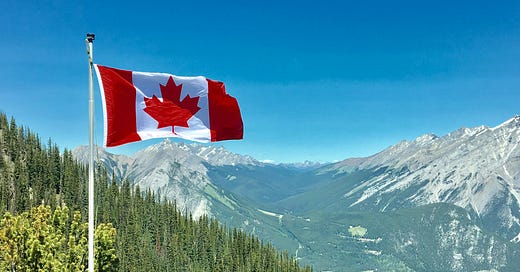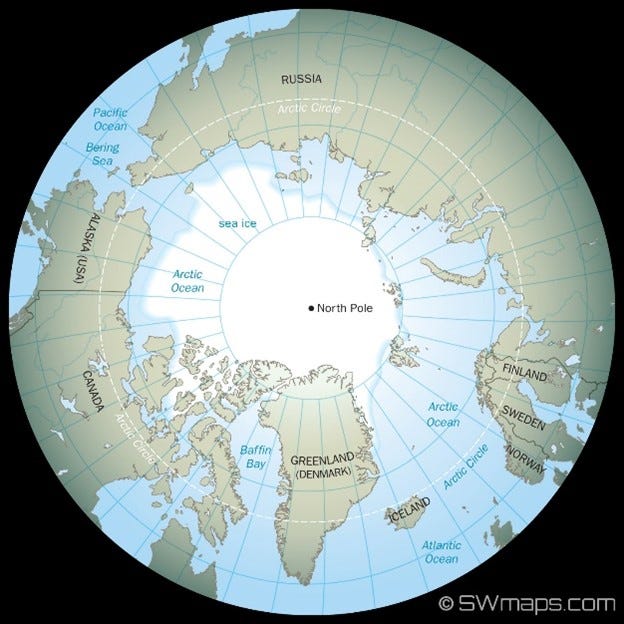Photo by Daniel Joseph Petty via Pexels
On November 25, 2024, then-President-elect Donald Trump sent shockwaves through our North American neighbors when he suggested that his administration would impose 25% tariffs on Canada and possibly Mexico.
Although many in the media and government have laughed it off as an irrational series of neuron flashes, Canada did not. By December 2, only a week later, then-Prime Minister Justin Trudeau made an emergency trip to Mar-a-Lago to speak with Trump.
How did Trump respond when Trudeau said that those tariffs would cripple the Canadian economy? Trump quipped, “If Canada can't survive without ripping off the US to the tune of $100 billion a year, then maybe Canada should become the 51st state, and Trudeau could become its governor."
As outrageous as the idea may seem at first glance, it’s possible that these discussions with Canada are about more than trolling Justin Trudeau. What is really behind the threats of high tariffs? Are economic considerations, the fentanyl crisis, the China threat, and U.S. national security part of it?
The answer is yes. All of it. But first…
How does Canada feel about it?
After conducting research on the subject, I’ve concluded that the polls are fake.
The mainstream media would have you believe that President Trump is ready to militarily invade Canada and the overwhelming majority of Canadians want nothing to do with joining the U.S. However, the open secret in the international community is that the United States has all of the leverage, and Canada is in trouble.
Canada is experiencing its most severe decline in living standards in 40 years, according to a recent study by the Fraser Institute.
“Middle-class families in Canada face the challenge of paying up to half their income in taxes. This, coupled with rising living costs, has created substantial economic strain. Canadian incomes are comparable to those in West Virginia, while house prices are akin to those in Los Angeles, making financial stability difficult for many,” according to
on Substack.
When you look at the latest data for the Canadian Housing Market below, imagine purchasing a home when you make $50,000 a year and pay nearly 50% in taxes.
Not surprisingly, over 80% of younger Canadians, ages 18 to 34, feel that Canada is broken. According to a recent poll, over 40% of Canadians are considering moving to a different country.
To demonstrate just how fragile the Canadian economy is, consider the fact that nearly 75% of the country’s exports are sold to the U.S., and much of that is oil and mineral fuels. Tariffs aside, what will happen to our northern neighbor’s economy when the United States begins drilling again?
President Trump was correct in highlighting what might happen to Canada if the United States were no longer to subsidize the nation. It’s no wonder that then-Prime Minister Trudeau was on the first flight to West Palm Beach following the President-elect’s tweet.
What’s in it for Canada?
Over the past two months, Trump promised Canadians U.S. citizenship, a 60% cut in taxes, better healthcare, a dramatically improved business environment, and ironclad military protection if they were to join America. Given what we know about Canada’s pending economic collapse, what’s not to love?
Let’s break down three areas:
1. Economic Solvency
Again, the media wants you to believe that President Trump is threatening to make Canada a state. But in reality, it’s a promise, not a threat.
Just ask Puerto Rico. It is begging to become the 51st State. This past November, over 56% of Puerto Ricans voted in support of statehood. That’s unlikely to happen, though. P.R. has very little to offer geopolitically, but would increase the burden on the American taxpayer.
Trump posted on Truth Social:
"Many people in Canada LOVE being the 51st State. The United States can no longer suffer the massive Trade Deficits and Subsidies that Canada needs to stay afloat. Justin Trudeau knew this and resigned," Trump wrote on Truth Social.
Canadian leaders insist that the U.S. needs “us as much as we need them” when it comes to trade, but President Trump debunked that idea when he spoke remotely to a crowd at the World Economic Forum in Davos, Switzerland, last week.
“We don’t need them to make our cars… we don’t need their lumber because we have our own forests… we don’t need their oil and gas; we have more than anybody.”
If Canada were to assume statehood, there would be no need to impose tariffs.
2. Military Protection
Canada is known for many things, but their military prowess is not one of them. According to the Global Fire Power study, Canada ranked 28th out of 145 countries, even though it is ranked no. 2 in land area with 3,855,100 sq. miles. The United States is ranked 3rd!
Trump also posted:
"If Canada merged with the U.S., there would be no Tariffs, taxes would go way down, and they would be TOTALLY SECURE from the threat of the Russian and Chinese Ships that are constantly surrounding them. Together, what a great Nation it would be!!!" he added.
Currently, Canada depends on NATO for military protection. However, NATO’s fate hangs in the balance, as we will discuss in the upcoming weeks.
3. Better Healthcare
Americans love to praise Canada’s “free” healthcare as the gold standard. But consider this: Is it really free if their income is taxed at 50%? As mom used to say, “There’s no such thing as a free lunch.”
A disturbing study recently emerged about the healthcare system in Canada. “Canada Killed Over 15,000 People Under MAiD Euthanasia Program,” according to LifeNews.com. These individuals were determined to be a burden to the system.
Let’s not forget that the United States already has a prototype for socialized medicine. It’s called the Veterans Administration. Maybe we should ask our veterans if they would recommend this program to the rest of us.
What’s in it for America?
Unlike Puerto Rico, Canada has much to offer in exchange for statehood. Let’s look at three areas:
1. Economic Dominance
In an article dated April 10, 2014 (over ten years ago), Politico journalist Diane Francis answered the question of “Why Should America Merge with Canada” by saying this:
“Put together, the United States and Canada would be a colossus, with an economy larger than the European Union’s—larger, in fact, than those of China, Taiwan, Japan, and South Korea combined. We would control more oil, water, arable land, and resources than any jurisdiction on Earth, all protected by the world’s most powerful military.”
And this is according to an article by Politico!
2. New Shipping Routes
The traditional two-dimensional, flat, rectangular map showing Alaska on the left and Russia on the right obscures the reality of our global positioning. Many nations are recognizing that traveling through the Arctic Circle is often the most direct route.
The Arctic Council released a study in 2024, citing a 37% increase in the Arctic over the past decade.
What greater leverage could the U.S. impose on Panama to hand back the Canal than to threaten to find a new route?
3. An Exit Strategy from NATO
Check back next week as we explore why the U.S. must exit NATO and how it can be done.
Thanks for reading “What in the World.” Remember to always pursue the truth, regardless of who is speaking.







As far-fetched as this sounds to us, I think it's because we are not used to having someone like President Trump in charge who knows how and loves to think outside the box.
"Two roads diverged in a wood, and I—
I took the one less traveled by,
And that has made all the difference."